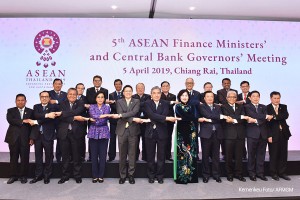ASEAN to Strengthen Cooperation on Taxation, Customs, Disaster Risk Finance

Minister of Finance Sri Mulyani attends the 5th ASEAN Finance Ministers and Central Bank Governors Meeting, held on 2-5 April 2019, in Chiang Rai, Thailand. (Photo by: Ministry of Finance/EN)
The Association of Southeast Asian Nations (ASEAN) Finance Ministers and Central Bank Governors 2019 Meeting has resulted in the enhancement of taxation and customs cooperation in supporting integration of economic activities and in improving trade facilities in the region.
In cooperation on taxation, ASEAN will continue to promote bilateral networks of avoidance of double taxation agreements among ASEAN member states and improve global initiative on the implementation of exchange of information for tax purposes.
ASEAN will also develop the operation of the ASEAN Single Window to boost digitalization in customs process and pilot ASEAN Customs Transit System scheme aimed at facilitating goods in transit.
Disaster financing is also raised as the main focus in ASEAN cooperation in which ASEAN Finance Ministers have agreed on the Phase 2 Plan of Action of the ASEAN Disaster Risk Finance and Insurance aimed at improving the capacity of the region to perform data processing and mapping of disaster risk profile in the region.
The initiative is expected to support the ongoing development of disaster risk financing strategy by a number of member states in the region, including Indonesia and also support the initiative of ASEAN+3 that has agreed on the establishment of Southeast Asia Disaster Risk Insurance Facility (SEADRIF).
The meeting has also agreed on several points, among others: (i) connectivity by improving trade and investment facilities and improving connection of financial and payment system; (ii) financial system resilience, particularly in anticipating digital economic developments and cyber security risks, and (iii) sustainability by optimizing capital market financing and banking mechanism for sustainable development and by enhancing micro-insurance to boost financial inclusion.
In the meantime, in a bid to improve the integration of the financial sector in the region, ASEAN Finance Ministers on that occasion also signed the 8th Protocol, namely ASEAN Framework Agreement on Services (AFAS) and agreed on the acceleration of negotiations for the 9th Protocol this year. The meeting also agreed on finalization of ASEAN Trade in Services Agreement, particularly for financial services that will be signed in the upcoming ASEAN Economic Ministers meeting at the end of April 2019.
Regarding infrastructure financing, the ASEAN Infrastructure Fund (AIF) develops two innovative financing scheme: (i) ASEAN Inclusive Finance Facility, which will develop access to concessional loans for Cambodia, Laos, and Myanmar, and (ii) ASEAN Catalytic Green Finance Facility, which will utilize the financing potential of regional and global development institutions, as well as funding from donor and private institutions to finance sustainable development projects in the region.
ASEAN member states will also continue to enhance cooperation on the development of capital market and financial sector, among other through: (i) the establishment of Working Group on Infrastructure Finance chaired by Indonesia and Malaysia to increase infrastructure financing through the capital market; (ii) the establishment of Working Group on Infrastructure Finance which will encourage the issuance of sustainable development bonds in the region using the ASEAN Green, Social, and Sustainability Bond Standards; (iii) publication of Guidance Notes on Digital Financial Services and Guidance Notes on Financial Education and Consumer Protection to encourage financial inclusion in the region; and (iv) cooperation on insurance development, particularly on micro-insurance which is aimed at giving access to lower middle class people who have not been protected by insurance. (Ministry of Finance PR/EN).
Translated by : Rany Anjany Subachrum
Edited by : M. Ersan Pamungkas








